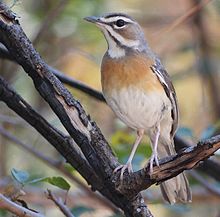| Miombo scrub robin | |
|---|---|
 | |
| Scientific classification | |
| Domain: | Eukaryota |
| Kingdom: | Animalia |
| Phylum: | Chordata |
| Class: | Aves |
| Order: | Passeriformes |
| Family: | Muscicapidae |
| Genus: | Tychaedon |
| Species: | T. barbata |
| Binomial name | |
| Tychaedon barbata | |
| Synonyms | |
| |
The miombo scrub robin (Tychaedon barbata) is a species of bird in the family Muscicapidae. It is found in Angola, Burundi, Democratic Republic of the Congo, Malawi, Mozambique, Tanzania, and Zambia. This species was formerly placed in the genus Cercotrichas .
